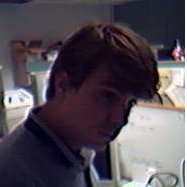
|
| Personal background |
|---|
| I'm a 23-year-old programmer/database administrator and a PC nut (my short past is marred by 1 mac...) I have built all my PCs by hand to date, and can't seem to build enough. I love traveling and I love my Jeep. (The irony that I own an inefficient car is not lost on me in relation to my little diatribe below). |
| Thoughts about SETI and SETI@home |
|---|
| I do believe that intelligent life exists out there somewhere, but I doubt if we'd be able to recognize it. I don't personally believe that humanity understands the concept of "intelligence" (SETI scientists aside, of course). If anything, intelligent life has already spotted us, taken a look and passed by with something akin to a "blah" and a shudder. Perhaps we should be lucky our rock still orbits the sun? While I would love to believe the idealistic concept of earth uniting to embrace a visitor from some distant planet, I believe the most realistic scenario would be more like siblings fighting over some new "toy". Then there's the whole concept of "tell me about you then I'll tell you about me". What about our past would make a good impression on someone who doesn't know us? How do you explain the children's crusades, the holocaust, racism, Jar Jar Binks and all the other wonderful things that have defined humanity? I know, I know, there are redeeming factors and not everyone is evil. I guess that answers the "should we transmit a beacon" question: no, unless we feel like revealing our ugly past. I'm ashamed and I wasn't even there. Despite all that I run SETI@HOME because I'm optimistic and I like helping out wherever I can (a saint I am not...). |
| Your feedback on this profile |
|---|
| Recommend this profile for User of the Day: |
I like this profile |
| Alert administrators to an offensive profile: |
I do not like this profile |
|
|

